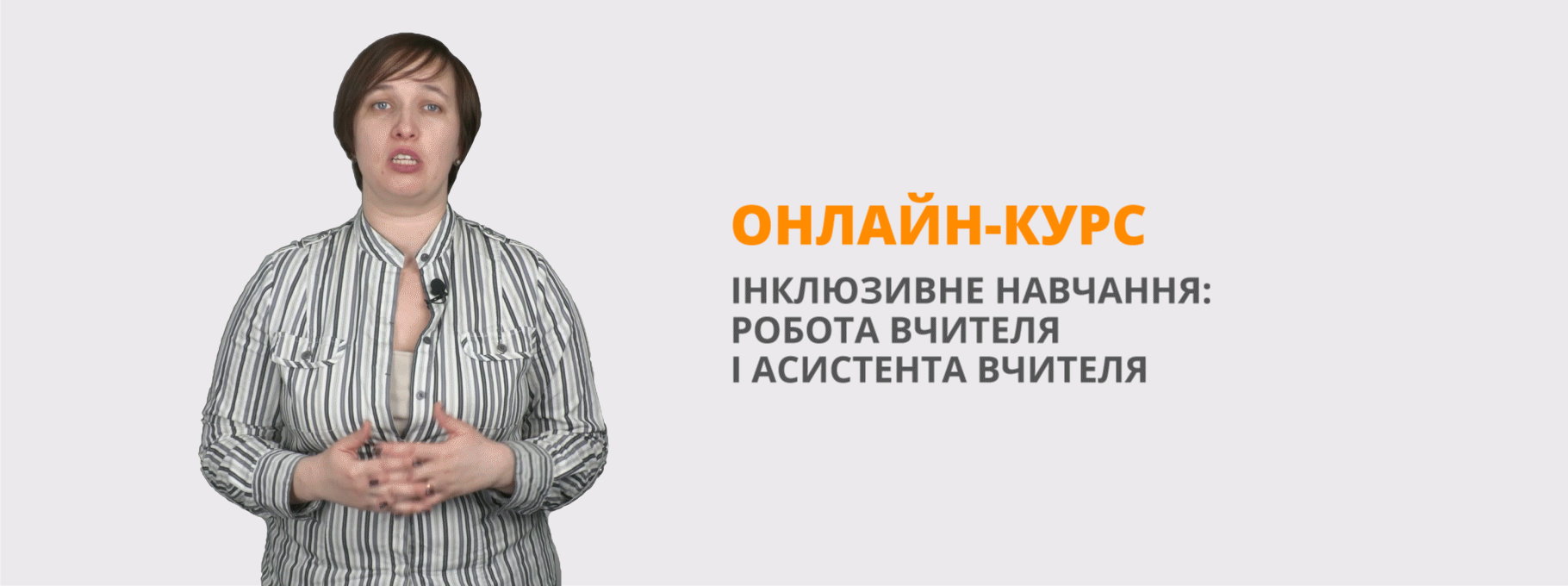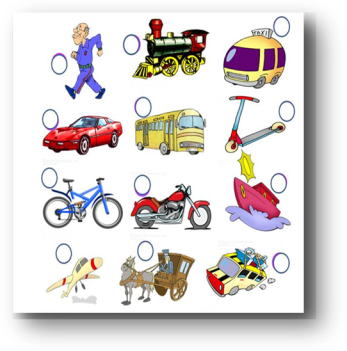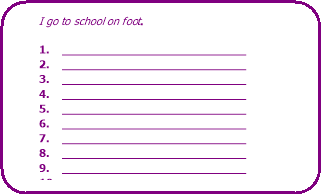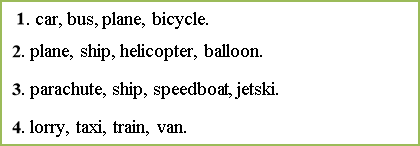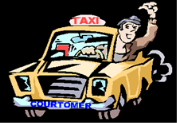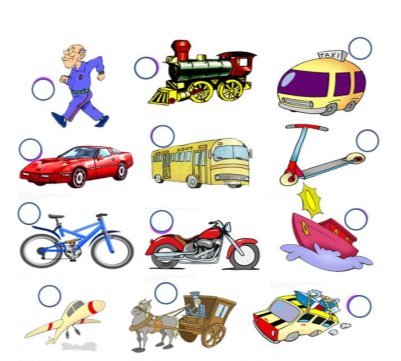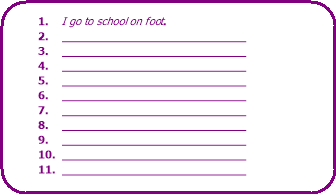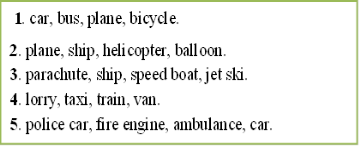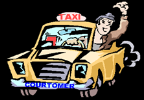Збірка конспектів уроків з англійської мови до теми "подорожі"
Дана підбірка складається із десяти конспектів уроків англійської мови з теми "подорожі". Конспекти уроків рекомендовані для використання у сьомих-девятих класах закладів освіти, а також для гуткових чи факультативних занять
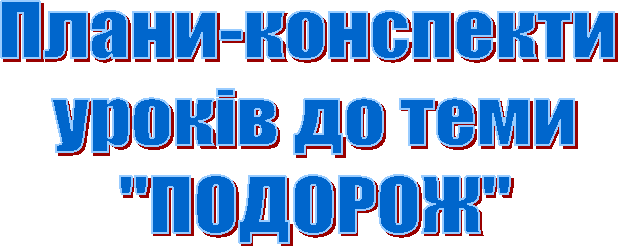
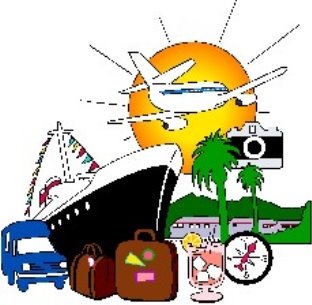 Підготувала: вчитель англійської мови Штогун О. О.
Підготувала: вчитель англійської мови Штогун О. О.
Lesson 1
Level: elementary
Objectives:
- to practice reading for specific information
- to revise the vocabulary of travel
- to practice giving opinions, agreeing, disagreeing
- to revise using adjectives (ending with -ing, -ed)
Materials: BB, PB, HO, a map, photos
Procedure
- Warming up.
A game “microphone” (puрils answer the teacher’s questions, using imaginary microphone (a toy one, a pen or a pencil)
- Do you like travelling?
- What kinds of transport do people use for travelling?
- Have you ever been abroad?
- Which countries have you visited?
(The pupils got the task to bring photos of the places they had visited.
They show the photos and tell about their trips. The teacher can ask them some questions in order to encourage their speaking or let them use the prompts written on the BB:
My parents and I visited …..
We went there by …..
It was …. years ago in …….
The teacher shows on the map all the places which the children are talking about)
- What countries would you like to visit? Why?
- Look at the pictures. This is St Petersburg. What country is it in?
- Have you ever been to this wonderful city? Let’s have a short trip around it. (watching video)
- Would you like to learn more about this magnificent place? Let’s read about the Winter Palace which is really worth visiting.
- Reading comprehension.
Ss listen to the advertisement and read the text on p.48 (English World 5, Macmillan) Choose the correct answer.
1. The Winter Palace is on the river
a) Petersburg b) Neva c) Russia
2. The staircases are made of ……
a) gold b) wood c) marble
3. The palace contains art and culture from Europe and …..
a) Asia b) Africa c) America
4. Archeologists found a gold bull in the ….. of a chief.
a) tunnel b) canopy c) tomb
5. It is better to visit the palace …..
a) in the morning b) in the afternoon c) in the evening
6. What did Clara like the most?
a) old paintings b) precious objects c) statues on the roof
Keys:1 b, 2 c, 3 a, 4 c, 5 a, 6 b.
- Grammar
Read the sentences and underline adjectives
- The palace is amazing.
- I liked the green walls and the white columns.
- The bright sun shone on the golden roofs.
An adjective tells you more about the noun.
Find and underline adjectives in the text. (Ss work in pairs during 5 minutes) How many words have you found? Read them aloud and write down on the BB (great, glittering, colourful, amazing, huge, stunning, shiny, new, wonderful, precious, unusual, exciting)
Use these adjectives to describe the pictures on the board. (This is a colouful picture with amazing buildings. It’s a huge palace with wonderful statues on the roof, etc)
Do you remember the difference between the words interesting – interested, boring – bored? Complete the conversation using the words in the box (boring, interested, exciting, interesting, bored, fascinating, fascinated)
- What are your hobbies, Sam?
- Well, I’m very …… in collecting stamps.
- Really? Isn’t that rather….?
- I don’t get ….. by it.
- I don’t find stamps very ….. , I’m afraid.
- Nonsense! Take a look at these. They’re ……..
- Hmm. You may be ….. by them, Sam. I prefer a more …. hobby.
- Such as?
- Pop music!
- Oh! How ……. !
Read the dialogue and then make your own ones discussing other hobbies such as football, dancing, playing computer games, travelling, etc.
- Summing up
You have learnt some information about the Winter Palace in St Petersburg; your home task is to be ready to speak about this place using the information from the textbooks or to find some more facts in the Internet about other interesting sights of this city.
Some pupils get the additional task – to make a project about the London Eye. (the teacher divides the children into two groups for completing this task)
WB p.33, ex. 2, 3.
Lesson 2
Level: elementary
Objectives:
- to learn and practice using the structure Have you ever…? I’ve never…
- to practice describing places
- to act out dialogues about travelling
Materials: BB, PB, HO, a map, photos
Procedure
- Warming up
1. Listen to the definitions of the words and guess them
- Things that happened in the past (history)
- Not believable (incredible)
- Very tired (exhausted)
- A beautiful building where kings live (palace)
- Very big (huge)
- A line of people (queue)
- It hangs from the ceiling for holding candles (chandelier)
- A set of stairs inside the building (staircase)
- A tall post which supports the building (column)
- A piece of paper advertising something (leaflet)
2. At home you did ex.2 and read about two wonderful places to visit. What are they? (the Winter Palace and the London Eye)
There are pictures of them on the BB. Each pupil get a card with a sentence, the task is to read it and to put near the correct picture.
- You can see 40 km from the top.
- It is next to the river Neva.
- You only need 30 minutes for a flight.
- You can walk up a big staircase.
- It is next to the river Thames.
- You go up in a glass pod.
- There are views over St Petersburg
- You have to walk a lot.
- You need more than a day to see everything.
- There are views over London.
- Ex.3 Read the sentences with the correct word from brackets.
- The view from the top of the London Eye is (amazing).
- The children were very (exciting) about their visit to London.
- Luke said, “The treasures in the Winter Palace are (astonishing).”
- Visitors are always (interested) in the history of the Winter Palace.
- Carla said, “I was (astonished) by the gold bull. It didn’t look old at all.”
- Presentation of students’ projects. (The teacher should check up the works beforehand in order to correct possible mistakes)
- Grammar
1. Look at this man. His name is Ed Darcy. He is a famous explorer. He has visited many countries of the world. He has been to Africa. He has been to Australia. What other countries has he been to? Look at the list and say: He has been to….
Ed’s Visits
South America x China x
Canada v Australia x
Africa v Egypt v
Russia x Peru v
North America v the Arctic x
- Ask and answer the questions:
Has he ever been to…? – He has never been to…
-
Grammar in conversation. Listen to the dialogue. Which countries has the girl been to?
- Have you travelled much, Daisy?
- Yes, a bit.
- Have you ever been abroad?
- Yes, I have.
- Where have you been?
- I’ve been to England, Spain and America.
- Wow! Lucky you! Have you ever been to Africa?
- No, I’ve never been there. How about you?
- No, not much. And I’ve never been abroad.
- Never mind. You’ll do one day.
4. Which countries have you been to?
Which towns have you visited?
Which places would you like to visit?
(The teacher can show the pictures with different towns or point them on the map)
5. Complete the dialogue ant then act it.
- How many countries have you ……..?
- I don’t ……… I’ve never counted.
- Have you …… been to America?
- Oh, yes. Lots …. times.
- Have you ever …… to Australia?
- No, but I’m going …. fly there next month.
- Lucky …… ! I’ve ……. been abroad.
- Never …… You’ve got lots …. time for travelling.
6. Doing grammar exercises (WB p. 34, ex. 1, 2, 3)
- Summing up
Lesson 3
Level: elementary
Objectives:
- to practice using Present Perfect with ever, never
- to practice using adjectives
- to revise making opposites of adjectives
- to write a review of a visit
Materials: BB, PB, HO, photos
Procedure
- Warming up
II. Lexical games. The pupils are divided into two groups. Two pupils get cards with the list of the group members. The rest of the pupils get cards with pictures (or words). The task is to find everybody from the list by asking questions:
-Are you a person who ……? (can drive a car, works at school, rides a horse, etc)
TEAM 1 TEAM 2
DANCER SINGER
RIDER PAINTER
SWIMMER BUILDER
BAKER RUNNER
TEACHER DRIVER
- Take the cards with the words and try to give the definitions (palace, incredible, travel, explorer, queue and leaflet).
- The teams get envelopes with the words cut into pieces. The task is to make the words as quickly as possible.
(fantastic, magnificent, fascinating, incredible, hilarious, dreadful)
- GOOD and BAD. The task is to complete the list of words with the synonyms where the first letters are written. Pupils write one by one during one minute and each team get as many points as many words they have written.
GOOD BAD
f…………. t………….
i…………. a………….
b………… d…………
a…………. h………….
e………….. h………….
f………….. b…………..
g………….
m………….
m………….
i…………..
(fantastic, incredible, beautiful, amazing, exciting, fascinating, great, marvelous, magnificent, interesting; terrible, awful, dreadful, horrifying, hideous, boring)
- Role play. One pupil of the team is a famous explorer; the others should ask him questions about the places he has visited. His task is to answer the questions using as many adjectives as possible.
(Have you ever been to England? – Yes, I have. It’s a fantastic country. My trip was incredible. I saw magnificent places and met interesting people.)
- We can add un to the beginning of some words to make a new word with the opposite meaning.
Read the examples on p.53, ex. 1
Let’s play a game. The teacher pronounces a word and shows some actions (eg. claps hands twice or three times, the pupils should repeat the actions and then say the word with the opposite meaning ( kind – unkind, happy – unhappy, true –untrue, friendly – unfriendly, usual – unusual)
Use these words to complete the sentences:
- Dan was ……. because he couldn’t do his homework.
- Mr Brown never says hello to us. He is very ………
- You must never be ………. To little children.
- The story of Jack and the Beanstalk is ….. It did not really happen.
- This bird is ……. because it makes its nest under the groung.
III. Writing preparation
Read the leaflet and imagine that you have visited this place.
When did you go there? What did you see? How did you feel?
(the teacher writes key words on the blackbard and pupils make the notes too)
- Summing up
Home task – to write a review.
Lesson 4
Level: elementary
Objectives:
- to learn about the features of a play
- to follow and read the play
- to answer comprehention questions
- to practice vocabulary
Procedure
- Lead in
You are going to read a play. You are going to read a play. It tells the story of one Greek hero. Guess who he is
One Greek hero,
Daring and brave,
Young and strong,
Sailed across the sea,
Saw hideous monsters,
Escaped from a whirlpool,
Unhappy away from home,
Said ‘goodbye’ to Calypso and left.
What do you know about him?
- Listening
What bad things happened in the play?
A STORY FROM THE ANCIENT WORLD
Odysseus was a famous Greek hero. He lived in Greece but for many years he was away from his wife and his son. He was fighting in a long war. At last the war ended and Odysseus began his voyage home. On the way he met many strange creatures.
THE VOYAGE OF ODYSSEUS
Scene 1
Setting: on the ship
Characters: Odysseus, captain, 4 sailors, a monster
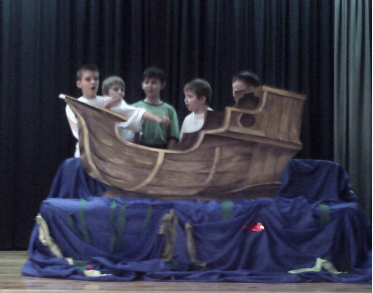
Odysseus: Listen, men. There are two horrifying sea monsters nearby. The first one has twelve legs, six necks and six heads, with three sets of teeth in each one!
Captain: That’s awful! We have never seen such a terrifying creature!
Odysseus: If a ship sails too near, the monster will…
Sailors: Help! The ship is rocking!
Odysseus: Row, row as fast as you can! The monster lives in the cave under those cliffs. He may be sleeping now but I will fight him if I have to.
Sailors: Row! Row!
Captain: We have just passed the cave. We are safe!
Sailor 1: No! Look at the water! We haven’t escaped yet.
Sailor 2: The ship is spinning round. What is happening?
Odysseus: It is the other monster! It is a giant whirlpool. It will put us under the sea!
Sailors: We must row!
Monster: Grrr!
Sailor 3: What is that?
Captain: It’s a giant dog!
Odysseus: No, it is the monster with six heads!
Sailor 4: Look, it is rising out of the water!
Monster: Grrr!
Sailor 1: Help! It is attacking us.
Captain: It is grabbing the sailors. It is eating them! Row! Row!
Odysseus: Now a storm is coming! The waves are getting higher and higher.
Captain: The wind is tearing the sail.
Sailor 2: The mast has broken!
Captain: The ship is turning over! Help! Help!
Scene 2
Setting: on the beach of a small island
Characters: Odysseus, Calypso (a girl)
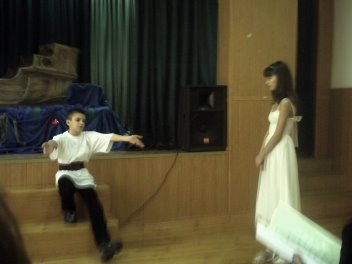
Odysseus: I was in the sea for ten days. Now I have reached an island. But is this a safe place? I don’t know.
Calypso: Hello. My name is Calypso. What has happened to you?
Odysseus: I have just swum to this island. My name is Odysseus. I am travelling to my home.
Calypso: Where is your ship?
Odysseus: There was a terrible storm. My ship disappeared under the water and all the sailors drowned.
Calypso: That is dreadful. Come to my home. My parents will look after you.
Odysseus: Thank you. You are very kind. I am exhausted, it’s true.
- Reading
What is the setting for the first scene?
What happened to the ship?
What happened to the sailors?
Children join in groups of five and read the play.
- Learning vocabulary
1. Match the words with their definitions (the words are written on the BB).
(hoorifying, escape, whirlpool, rock, hero, sail)
- A very brave man ,
- a dangerous place in the river or sea,
- to move from side to side,
- very frightening,
- to get away from.
First the teacher reads the definitions and pupils together try to find the necessary word. Then they get cards with these definitions, read them and ask the classmates to name the words. The hometask is similar to this one so pupils can easily do it (WB p.42, ex. 2)
- Read two grouрs of words and find the synonyms (PB p.60, ex. 3).
Then children get cards with these words, the task is to join into pairs
(tired – exhausted, journey – voyage, fight – attack, animal – creature, terrifying – horrifying, awful – dreadful).
A game with a ball (children should catch the ball and name the synonym).
- Role play
The children are joined in two groups they choose the caracters and try to act the play. (The teacher advises the vіst capable pupils to learn the leading parts, but all the rest were encouraged to participate too. First the groups performed the play in the classroom, in a week pupils from other forms were invited to the Assembly Hall to watch the play).
Lesson 5
Тема «Різні види транспорту»
Topic of the lesson: DIFFERENT MEANS OF TRANSPORT
Level: elementary
Objectives:
- To present and practice new vocabulary;
- To develop students' listening and speaking skills;
- To practise the usage of Present Simple
Materials: Multimedia set, power point presentation, video, handout on the topic (cards, pictures) ,flashcards “Means of transport”.
PROCEDURE
|
INTRODUCTION |
|||||||||||||||||||
|
Greeting |
Teacher: Good morning, children! How are you getting on? What is the weather like today? Is it cold or warm? Is it sunny/windy/frosty/cloudy today? (Some pupils describe today’s weather. |
||||||||||||||||||
|
Warming up |
Teacher: Look at the exercise on the blackboard. There is one mistake in the each of the sentence. Find and correct the mistakes.
1)My Dad am a teacher. 2)Oleg and Mykolka is friends. 3) I has got a brother. 4) We the children. 5)There is many trees in the park. |
||||||||||||||||||
|
Cheek on Homework |
Pupils read their previous hometask. |
||||||||||||||||||
|
The aim of the lesson |
Teacher: Let's read the poem. In the street you can see Buses, cars and a taxi. In the sky there is a plane, On the rails there is a train.
Teacher: Read the poem one more time and guess what is the topic of our lesson today? Ps: (answer the questions) Teacher: Yes, you`re right. Today we are going to speak about different means of transport. |
||||||||||||||||||
|
II.MAIN PART OF THE LESSON
|
|||||||||||||||||||
|
Presentation of the vocabulary “Means of transport”
Listening |
1. The teacher presents new words according to the topic “Different means of transport (Flash cards are a classic teaching too land make introducing new material, such as vocabulary words.). At first, pronounce each word, have students repeat each word as a class, and prompt them the translation.2.Teacher:Dear children Watch the video and listen to the song very carefully. (In this video, kids learn about the different means of transport.) http://www.youtube.com/watch?v=X2a_9i87Qno(“Transport” Educational Videos for Kids)
|
||||||||||||||||||
|
Drilling vocabulary
Handouts for pupils(1) |
2. Teacher:In exercise №1 match the words with the pictures. Firstly read the words in English, please,then write the number to the right picture. Start with the words you know.
Exercise 1 Match the words with the pictures
|
||||||||||||||||||
|
Writing
Handouts for pupils(2)
Grammar
Conclusion
Summing up
|
Exercise 2 Look at the picturesin exercise 1 and answer the question: How do you go to school? (use different kinds of transport)
Exercise 3 Complete the table grouping the means of transports according to the place:
Exercise 4 Circle the odd one out.
Exercise 5
ButonSundayshe _____(not\ todrive) histaxi.
He ____(to stay) athome. He _____(to like) his car.
Nowourlessonisover. Thankyouforyouractivework. Youworked very nice today. Your marksfortoday are…. Yourhometaskistolearnnewwordsbyheart. Ex.2-4; Thankyouforthelesson, thelessonisover.Goodbye.
|
||||||||||||||||||
HANDOUTS FOR PUPILS
|
|
||||||||||||||||||||
|
Exercise 2 Look at the picturesin exercise 1 and answer the question: How do you go to school? (use different kinds of transport) |
Exercise 3 Complete the table grouping the means of transports according to the place: |
|||||||||||||||||||
|
|
|
|||||||||||||||||||
|
Exercise 4 Circle the odd one out
|
James _____(to be) a taxidriver. He ____(todrive) a taxi. ButonSundayshe _____(not\ todrive) histaxi.
He ____(to stay) athome. He _____(to like) his car.
|
|||||||||||||||||||
Lesson 6
Topic: Travelling. It’s great to travel.
- Practical aim: to form lexical competence on the topic “Travelling” to develop the pupils’ skills and habits of unprepared speech.
- Adjoining tasks: to develop the pupils’ grammar skills in using Present Indefinite and Past Indefinite Tenses related to the topic.
- Cultural aim: to cultivate the pupils’ interest to learn different things about the world around us.
- Developmental aims: to incorporate pupils’ pair and independent work; to develop creative thinking and mutual respect.
- Equipment: pupils’ books and workbooks, topical pictures, a lap top computer.
The procedure of the lesson
I Greeting
Hello, children! It’s nice to see you! Well, everybody looks wonderful today. The topic of our lesson is “It’s great to travel”.
II Introductory teacher’s talk about travelling.
Everybody knows that modern life is impossible without travelling. We often travel for pleasure. While travelling you learn a lot of interesting things about the places you have visited, relax and after all you become homesick. But you realize how happy and lucky you were visiting the seaside or the mountains other countries and cities.
T.: What way of travelling do you prefer?
P.1: I prefer travelling by car. It’s more comfortable
P.2: I prefer travelling by air. It’s the fastest way of travelling.
P.3: I prefer travelling by train. It’s the cheapest way of travelling.
T.: Let’s revise the poem (altogether).
Over the mountains,
Over the plains
Over the rivers
Here come trains
Carrying passengers,
Carrying mail
Over the country
Here come trains.
III Revision of the vocabulary related to the topic.
So children we know a lot of worlds related to this topic. Let’s revise them (The pupils are given a printed exercise. Everyone can see it on the screen).
- Let’s match two parts of the expressions.
To have home
To get the bus
To travel cheap tickets
To visit a holiday
To miss by plane
To come back to the railway station
To spend beautiful places of interest
To buy a wonderful journey
To enjoy fantastic time
- Now children come up to the blackboard, divide into three groups and write down the verbs, the adjectives which will be helpful to discuss our topic. Read it please. “It’s Great to Travel”.
Nouns Verbs Adjectives
Journey, trip, voyage, travel, swim, go, nice, beautiful, wonderful,
Seaside, beach, ticket, buy, take, enjoy, fine, cheap, expensive,
Luggage, ship, car, bus, be, arrive, play, spend, excellent, great,
Train, holiday, weather, feel, fly, get, fantastic, hot,
Summer, games, forest, have, come back, sunny……………….
River, pictures……. Catch, miss………….
IV Work in group
You are very active today. Do you want to express you opinion about travelling?
Come up to the blackboard divide into two groups. So, the first team is the “The best Chance” and the second one is “A brilliant idea”. Take the sheets of paper. Look through, read and express your opinion and give your reasons beginning with the words’.
I’m sure………………., I believe …………………….
The first team:
P.1: I believe travelling is the best chance to have a wonderful trip to the seaside because it’s fantastic.
P.2: I believe travelling is the best chance to go on a voyage on board the ship because it is excellent.
P.3: I believe travelling is the best chance to enjoy the beauty of nature because it is great.
P.4: I believe travelling is the best chance to spend much time swimming in the sea and playing different games on the beach.
P.5: I believe travelling is the best chance to visit our nearest and dearest.
P.6: I believe travelling is the best chance to enjoy your holidays in the mountains or the forest, near the river or near the lake.
The second team:
P.1: I am sure it is a brilliant idea to go on a journey because it is interesting to visit many famous places.
P.2: I am sure it is a brilliant idea to go on a trip because it is interesting to meet new friends.
P.3: I am sure it is a brilliant idea to go on a hike to the mountains because it is the best chance to see their beauty.
P.4: I am sure it is a brilliant idea to go on a journey to other countries to learn a lot of different things about the words around us.
P.5: I am sure it is a brilliant idea to go on a journey because it is a good chance to take journey because it is a good chance to take nice pictures of places of interest.
P.6: I am sure it is a brilliant idea to go on a trip to other countries because it is interesting to learn different customs and traditions of people who live there.
T.: Thanks a lot! I see you are great travelers because you can express your opinion about travelling clearly. And I hope I’ll have a wonderful trip to the seaside in August.
V Develop speaking skills.
So children look at the screen.
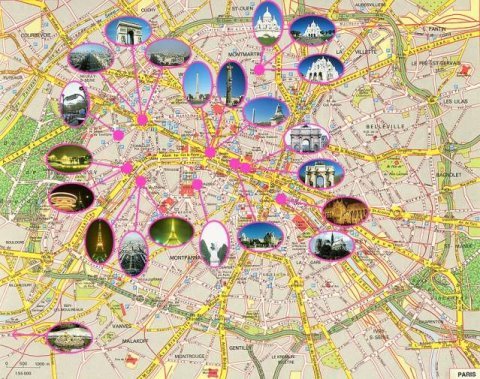
You see a touristic map of Europe. You can choose different places to visit on your holidays. Try to choose the best one and explain why the place is your choice.
P.1: I think Britain is the best country to visit, it has many historic places.
P.2: I am sure France is the best country to see because there are a lot of places of interest there.
P.3: I believe Italy is one of the beautiful countries to travel because the people are friendly and the nature is fantastic there.
P.4: I hope travelling to Greece is great. I think so because Greece is famous for its museums and historic places.
P.5: Of course Switzerland is really a nice place to spend holidays because you can enjoy visiting the Swiss Alps.
T.: I agree with you (P.5) because going to the mountains is one of the best ways to spend holidays.
So, let’s try to make up a story with the title “My Last Trip To The Mountains”.
I’ll be the first to start, and everybody will add to continue the story. Look at the screen.
- A lot of people in different countries are fond of travelling ……. P.1: by car, by train, by plane, by ship.
- I’d like to tell you about my last trip to the mountains……P.2: It was in July.
- The first thing we did we went to the railway station and…..P.3: bought tickets for a train.
- It was rather cheap and comfortable.... P.4: to go by train.
- It took us fourteen hours… P.5: to get there.
- The train arrived at the railway station…. P.6: early in the morning.
- We got off the train and… P.7: went to the bus stop by taxi.
- We were lucky to catch our bus…. P.8: So we went straight to that place.
- Then we went some metres… P.9: on foot.
- It was not easy to go up the mountains because…. P.10: we took a lot of luggage with us.
- But we enjoyed watching the mountains and….. P.11: the nature around us.
- We were happy!.... P.12: How beautiful it was in the mountains.
- We stayed there… P.13: for a week.
- Certainly we spent… P.14: a wonderful time there.
- We walked a lot,… P.15: played different games, sang songs.
T.: So, children our time is up. So, you have worked hard and I’m pleased with your active work.
VI Home assignment: make up a story “Travelling is the best chance to spend a wonderful time.”
VII Conclusions. The pupils get marks.
Match the parts of the expression:
To have a holiday
To get to the railway station
To travel by plane
To visit beautiful places of interest
To miss the bus
To come back home
To spend a fantastic time
To buy cheap tickets
To enjoy a wonderful journey
Lesson 7
Мета:
- Ознайомити учнів з темою уроку.
- Активізувати ЛО теми в мовленні учнів.
- Вчити висловлювати особисту думку.
- Активізувати навички говоріння, аудіювання, письма, читання.
- Формувати навички діалогічного мовлення на рівні мікродіалогу з опорою на аудіювання тексту.
- Розвивати мовну здогадку, вміння самостійно працювати комп’ютері, сприяти загальнокультурному розвитку учнів.
- Виховувати уважність, активність, зацікавленість у подорожах та вивченні англійської мови.
Обладнання: комп’ютери, комп'ютерні програми, наочність, магнітофон, аудіозапис тексту.
ХІД УРОКУ
1. Підготовка до сприйняття іншомовного мовлення. 1.Організаційний момент. Привітання.
Good morning!
I am glad to see you.
How are you?
Is anybody absent?
Who? Why?
2.Повідомлення теми та мети уроку.
The topic of our lesson is “Travelling“.
By the end of the lesson you will be able:
- To recognize and understand new words and word-combinations when reading the sentences.
- To understand main ideas from the text when listening to it.
- To use words and word-expressions when speaking.
3.Уведення в іншомовну атмосферу.
Pronunciation drill. Фонетичне та лексичне відпрацювання вірша.
TRAVELLING
We go by car
And we go by train. We go by boat,
And we go by plane.
We go by land
And sea and air,
We go, go, go,
From here to there.
4. Discussion. Бесіда з учнями за змістом вірша.
-Using what means of transport can you travel by land?
-Using what means of transport can you travel by sea?
- Using what means of transport can you travel by air?
II. Основна частина уроку.
1. Повторення та активізація вивчених раніше ЛО теми.
1. Учні повторюють за диктором слова, які знаходяться на екрані комп’ютера.
2. Знайти український еквівалент до англійського слова, (учні
виконують тест на комп’ютері)
3. Бесіда з учнями. DISCUSSION.
- Is traveling popular nowadays?
- What means of traveling do you know?
- Which is the fastest way of traveling?
- How do people travel when they go for abroad?
- Is traveling by car faster or slower than by train?
- Do you like to travel by train?
- Do you like to travel by car?
4. Пред’явлення текстів для читання.
(учні читають текст і відгадують до якого виду транспорту він належить)
№1. It is the fastest way of traveling/ It can take you from one town to the other one in time. The seats are comfortable. That is a pity but sometimes you can see very little from the windows. The things are too small to see them. When the weather is rainy or foggy you can not travel by it.
( )
№2.This way of traveling is fast. You can stop at any place you like and
go where you like. You need no tickets. Usually families go by it.
( )
№3.This is the slowest way of traveling. Both young and old people like it. You need not worry about the tickets. The only thing you need is a rucksack. You can visit many places in such away.
( )
№4.This way of traveling is fast. The carriages are comfortable. It is so pleasant to travel in them. You can see a lot of interesting things from carriage windows. You can make a long journey on land by it.
( )
4. Фізкультхвилинка
STOP! LOOK!
Trams and cars Look to this side,
In our town Look to that side.
Run up and down, The green says "go"
Run up and down. Now go slow!
Stop! Look at the light! The red says "stop'
First look to the left, Now do so.
And that to the right.
5.Закріплення лексичного матеріалу по темі „Подорож" у мінідіалогах.
1.Учні слухають діалог, що записаний на касеті. Listening. 2. Складають свої діалоги за ситуацією. Production.
6. Виконання вправ за темою „Подорож", (учні працюють на комп’ютері)
№1
Розставити інтервали між словами і прочитати речення.
Тhe words in these sentences have been pushed together. Find out what they are by separating then again.
- Iusuallytraveltoworkbycar.
- Thebusstopsatthesupermarketintown.
- Travellivgisverypopularnowadays.
- Manypeopleliketotravellbycar.
№2
Закінчити наступні речення.
Finish the sentences.
a) The fastest way of traveling is ......... (by plane)
b) Traveling by train is slower than....... (by plane)
c) When traveling by car you can make your own time-....... (table)
d) There are many ways of getting about the ...... (town)
№3
Прочитати речення і позначити вірні та невірні твердження.
Read the sentences and noticed if the sentences are true or false.
|
|
TRUE |
FALSE |
|
1. Travelling is not popular nowadays. |
|
|
|
2. We can not imagine our life without transport. |
|
|
|
3. We must cross the street when the light is green. |
|
|
|
4. Trams, trolley-buses and buses do not stop at special stops. |
|
|
|
5. The metro is the fastest way to get about town. |
|
|
|
|
|
|
|
|
|
|
ІІІ. Заключна частина уроку.
1. Домашнє завдання.
2.Підбиття підсумків уроку.
What topic have we spoken about at the lesson? Do you like to travel? What have we done?
3.Оцінювання.
Lesson 8
Тема. Подорож до Нью Йорку
Objectives:
To practice vocabulary (city, New York landmarks.)
To read for detailed information.
To speak about New York.
To write a short composition (combining sentences).
Equipment:
Tapescript of the text, worksheets, photos, tables, evaluation cards.
Procedure
-
Greetings Warming up.
- New York is great! Do you agree? What do you think about when you hear "New York"?
-
Speaking.
- Ss look at the photos, name the famous places in New York and tell what one can do there.
-
Writing.
- In pairs, Ss write the words correctly, make up the sentences orally.
Avile, sgerjog, erryf, daeh, effto, manpercefor, mentterentain, bur, doushelrs, tibe.
- Ss fill in the propositions and write the sentences.
To (2), with (3), of (3), for, from (2), in (2), on.
- A trip… the Big Apple is great, … hundreds … things to do and see.
- One of the first places to head … is Manhattan.
- You can take a walk … Central Park.
- It is always alive … skaters, cyclists and joggers.
- Central Park is a home … the zoo and the Metropolitan Museum of Art.
- The Statue of Liberty is a short ferry ride … the centre.
- You have a nice view … New York … the crown.
- You can see some … the best performances and musicals … the world.
- You can rub shoulders … the rich and famous … Broadway.
-
Writing a composition.
- students read the sentences, the teacher explains all unknown words, the students read them out from the text.
- A saxophone player stands on the sidewalk (pavement).
He stands there each afternoon.
He is in New York.
He plays Danny Boy.
- He plays in a sad way.
The neighbours peek out of windows.
They toss coins at his feet.
- Some coins roll under parked cars.
He catches most of them.
- The saxophone player is a street musician.
He is Joe Gabler.
- People toss 100 dollars a day.
- Buckets of water hit him.
Wild dogs chase him.
-
He is the last of New York’s street musician.
- Students combine the sentences and write a short composition.
Example
A saxophone player stands on the sidewalk each afternoon in New York. He plays Danny Boy in a sad way, so that the neighbours peek out of windows and toss coins at his feet. Some coins roll under parked cars, but he catches most of them. The saxophone player Joe Gabler is a street musician. People toss 100 dollars a day but buckets of water hit him and sometimes wild dogs chase him. Is he happy or miserable? Maybe he is the last of New York’s street musician.
- Home assignment: read the text and draw the picture.
answer the question: is the musician happy or miserable?
6. Evaluation.
Students tick the following columns
I took part in 1. answering questions
2. listening
3. reading
4. speaking
5. writing
6. making sentences
Lesson 9
Мета: вдосконалювати навички читання, аудіювання й усного мовлення, вживання нових лексичних одиниць; розвивати мовленнєву реакцію й пізнавальні інтереси учнів; виховувати зацікавленість у розширенні своїх знань.
Обладнання: підручник, презентація, роздатковий матеріал, відео, карта світу.
Хід уроку:
1. Warm-up
- Topic introduction.
-
Good morning! - How are you? The topic of our lesson is Travelling is interesting. Do you agree with it? What is your opinion about travelling?
- Warm-up.
Look at our presentation and match the parts of the proverbs. Слайд 2.
1) He who travels far a) who travels knows more
2) There are as many paths b) one hundred times heard about
3) Who lives knows much c) knows much
4) One time seen is better than d) as there are travellers
2.Vocabulary revision.
2.1 Look at the crossword and find eight words describing travelling. Cлайд 3
|
a |
c |
o |
m |
f |
o |
r |
t |
a |
b |
l |
e |
p |
d |
|
f |
s |
h |
i |
q |
z |
p |
t |
v |
e |
s |
h |
m |
a |
|
s |
y |
l |
e |
x |
p |
e |
n |
s |
i |
v |
e |
e |
n |
|
a |
t |
f |
m |
g |
h |
n |
e |
j |
k |
i |
b |
y |
g |
|
f |
d |
a |
e |
x |
c |
i |
t |
i |
n |
g |
v |
r |
e |
|
e |
s |
s |
h |
b |
l |
n |
v |
k |
r |
o |
c |
s |
r |
|
u |
u |
t |
x |
e |
n |
j |
o |
y |
a |
b |
l |
e |
o |
|
j |
l |
k |
c |
v |
w |
h |
y |
u |
o |
p |
e |
g |
u |
|
q |
x |
a |
s |
t |
i |
r |
i |
n |
g |
x |
a |
z |
s |
2.2Complete the word-web
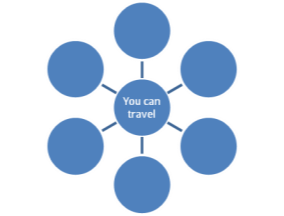
2.3Make the sentences using the adjectives and the means of transport. Слайд 4
i.e. Travelling by car is comfortable.
2.4. Decipher the words. Слайд 5
1. The …(pirator) was very busy.
2. We took only one…(cusaties) with us.
3. On a…(tacivano) people like a change.
4. My last…(norujye) was exciting.
5. Don’t forget a …(remaca) to take photos.
1.5. Make up questions with these words and put them to your classmates.
i.e. Have you ever been to the airport? – No, I haven’t.
3.Listening.
3.1 Watch the video “At the travel agent” and place the phrases into two columns. Слайд 6.
1. How can I help you?
2. I was thinking of going to Australia.
3. How long is your vacation?
4. Here’s our Sydney brochure.
5. Would you like me to make a booking now, sir?
6. It’s expensive but I’ve been told it’s very nice.
7. Just one week.
8. It’s a very high-class hotel.
9. Yes, please.
10. Have a look and see if there’s a hotel that you like.
a travel agent a client
3.2 Watch the video one more time and put the phrases of the dialogue in the correct order.
- Good morning, sir! How can I help you?
- Well, I have some time off from work next month and I was thinking of going to Australia.
- Hm, that sounds great. How long is your vacation?
- Just one week. My last day at work is the 26th of July and I go back on the 5th of August.
- OK. Here’s our Sydney brochure. Have a look and see if there’s a hotel that you like.
- Oh, this one’s good. “The Four Seasons Hotel”. It’s expensive but I’ve been told it’s very nice.
- Yes, It’s a very high-class hotel. I’m sure you’ll enjoy your stay there. Would you like me to make a booking now, sir?
- Yes, please.
(- Well, I have some time off from work next month and I was thinking of going to Australia.
- Yes, It’s a very high-class hotel. I’m sure you’ll enjoy your stay there. Would you like me to make a booking now, sir?
- OK. Here’s our Sydney brochure. Have a look and see if there’s a hotel that you like.
- Yes, please.
- Good morning, sir! How can I help you?
- Oh, this one’s good. “The Four Seasons Hotel”. It’s expensive but I’ve been told it’s very nice.
- Hm, that sounds great. How long is your vacation?
- Just one week. My last day at work is the 26th of July and I go back on the 5th of August.)
3.3. Complete the dialogue and act it out.
- Good morning, sir! How can I help you?
- Well, I have some time off from work next month and I was thinking of …
- Hm, that sounds great. How long is your vacation?
- …. My last day at work is … and I go back on the ...
- OK. Here’s our … brochure. Have a look and see if there’s a hotel that you like.
- Oh, this one’s good. “...” It’s …
- Yes, It’s a … hotel. I’m sure you’ll enjoy your stay there. Would you like me to make a booking now, sir?
- Yes, please.
4. PT minute Song Over the mountains
|
Song Travelling
Refrain: And over the mountains, through the trees travel the world and seven seas.
I’m sailing in a ship I’m driving in a car Refrain: And over the mountains, through the trees travel the world and seven seas.
I’m travelling on a train I’m sailing in a ship I’m driving in a car Refrain: And over the mountains, through the trees travel the world and seven seas.
I’m riding on a horse I’m travelling on a train I’m sailing in a ship I’m driving in a car Refrain: And over the mountains, through the trees travel the world and seven seas.
|
-
Grammar practice The use of the definite article before geographic names.
- Use the article “the” where necessary.
1.Where are…British Isles?
2.They brought the potato to…Europe from…America.
3.…Statue of Liberty was a gift from…to…United States.
4.He lived in…South-East, then he moved to…North.
5.…Asia is between…Black Sea and…Mediterranean Sea.
6.This man is…English.
- Quiz It’s a superlative world. Ex. 1. p.106. Make up the questions for a quiz and do the quiz in class. Слайди 7-14
-
Reading
- 6.1 Read the texts and define the country. Show it on the map Слайд 15
- It is the second largest country in the world. It covers 9, 976, 185 square kilometres. The population is 27 million people. Most of the population speak English, but about 6 million speak French. In winter it is very cold and there is a lot of snow. The head of the state is the British Queen. The capital is Ottawa. Other big cities are Toronto, Montreal and Vancouver. Tourists come to see the Niagara Falls.
- It is in the South of North America. The Gulf of Mexico is to the east, the Pacific Ocean is to the west. It covers more than 950, 000 square kilometres. It is a Spanish-speaking country. The capital is Mexico City. With an estimated population of over 113 million, it is the world's eleventh most populous country. The head of the state is the President. The weather is very changeable, cooler in the north and hotter in the south. Every year tourists come to see “the City of Gods”. It is one of the most important and interesting places from ancient country.
- It is an island nation in East Asia, located in the Pacific Ocean. It has the world's tenth-largest population, with over 127 million people. The climate is subtropical with warm winters and hot summers. More than 99 percent of the population speaks Japanese as their first language. The head of the state is an Emperor. The capital is Tokyo. The largest cities are Yokohama and Osaka. Beautiful nature and exotic plants attract millions of tourists every year.
-
It is a transcontinental country situated mainly within North Africa. The Red Sea is to the east, the Mediterranean Sea is to the north. The official language is Arabic. The summers are hot and dry. It covers an area of about 1,010,000 square kilometers. The capital is Cairo. It is one of the most populous countries in Africa and the Middle East, and the 15th most populated in the world. Other big cities are Alexandria and Giza. The Sphinx and the pyramids are some of the places of interest in this country.
- 6.2 Raise the flag of the country that I will read about.
- The capital is Tokio.
- The head of the state is the British Queen.
- It is a Spanish-speaking country.
- Tourists come every year to see the pyramids.
- It is an island nation.
- The official language is Arabic.
- It is the second largest country in the world.
- It is in Africa.
- There are two official languages.
-
Tourists come to see the largest waterfall.
- 6.3Complete the sentences and prepare a leaflet. Pupils work in groups
Complete the sentences
1.It is a…
2.The population is…
3. The official language is…
4. The head of the state is…
5. The climate is…
6. The capital is…
7. The largest cities are…
8. Tourists come to see…
7. Speaking
7.1. Speak about the country using the information
Speak about the country Слайд 17
- Location: the fourth largest country in the world. It occupies the southern part of North America The total area of the country is about nine and a half million square kilometres
- Population: 250 million.
- Capital: Washington
- Climate: very different in different parts
- Language: English
- The head: the President
- Large cities: New York, Los Angeles, Chicago,
- Places of interest: Hollywood, the Wall Street, the Statue of Liberty, the Library of Congress, the White House and many others.
Speak about the country слайд 16
- Location: a continent-island washed by the Indian and the Pacific Oceans.
- Population: 16 million
- Capital: Canberra
- Climate: not very good, it is very wet in the north and dry in the west
- Language: English
- The head: the British Queen
- Large cities: Sydney, Adelaide
- Places of interest: unique animals and plants.
- It is a continent-island washed by the Indian and the Pacific Oceans. The population is 16 million people. The official language is English. The climate is not very good, it is very wet in the north and dry in the west. The head of the state is the British Queen. The capital is Canberra. Other big cities are Sydney, Adelaide and others.
8.Summary Homework Слайд 18
8.1Make up a leaflet for visitors to your country
8.2* Prepare a project about a country you’d like to visit.
Lesson 10
Тема: Подорожі у нашому житті.
Мета уроку:
Практична: контроль мовленнєвих навичок з теми «Подорож», продовжувати вдосконалювати лексико-граматичні навички читання, аудіювання та говоріння з теми уроку;
Розвиваюча: розвивати мислення, пам'ять, самостійність, вдосконалювати навички зв’язного мовлення, розвивати інтелект, стимулювати розвиток пізнавальної активності.
Виховна: виховувати бажання до набуття знань та практичного їх застосування на уроках іноземної мови, почуття гідності, прищеплювати почуття відповідальності.
Тип уроку. Урок узагальнення та систематизації отриманих знань.
Оснащення уроку. Текст для читання, тест для аудіювання, мультимедійна презентація, малюнки, пісня «Оver the mountains»
Хід уроку.
Початок уроку.
- Привітання, організаційний момент.
Teacher: Good morning, dear children! Glad to see you. Tell me, please, who is on duty today? Who is absent? What day is it today? What date is it today? What is the weather now? What temperature is it now?
Thank you very much.
- Мотивація навчальної діяльності та повідомлення теми та мети уроку. (слайд 1)
Teacher: We’ve just studied the theme “Travelling” and this lesson is devoted to this theme. During our lesson we’ll review our vocabulary, tenses, listen to the song, watch a presentation, make and act our dialogues.
- Фонетична зарядка. (слайд 2)
East or west – home is the best.
There’s no place like home.
A journey of a thousand miles begins with a single step.
- Мовленнєва зарядка.
Teacher: You know that nowadays people like to travel very much. Today we shall speak about different kinds of travelling. At first let’s check what kinds of transport do you know. Teacher: To begin with, let’s remember the words
- Complete the spider gram.(слайд 3)

- Vocabulary.(слайд 4)
Look at the words below and try to do the matching between words and definitions.
|
1. travel |
a. a long trip, especially in a ship |
|
2. journey |
b. to move from one place to another |
|
3. voyage |
c. the bags carried by the people who are traveling |
|
4. luggage |
d. a good or useful quality that something has |
|
5. advantage |
e. a trip from one place to another |
|
|
|
- Find the names of means of transport (слайд 5)
|
T |
J |
B |
C |
S |
H |
I |
P |
T |
C |
|
R |
E |
U |
A |
R |
A |
F |
T |
R |
A |
|
A |
T |
S |
R |
T |
A |
X |
I |
A |
M |
|
M |
B |
I |
K |
E |
F |
R |
B |
I |
P |
|
A |
I |
R |
P |
L |
A |
N |
E |
N |
E |
|
F |
E |
R |
R |
Y |
B |
O |
A |
T |
R |
|
H |
E |
L |
I |
C |
O |
P |
T |
E |
R |
Основна частина уроку.
- Узагальнення лексико-граматичного матеріалу.
Teacher: Thank you for your good work, I have another task for you.
Rearrange the letters to make words.
Exercise1. (слайд 6)
- My mother travels by ….. train (SAFT)
- We ….. at the bus stop yesterday. (RRAIDEV)
- It was a nice ….. (RIPT)
- We spent our holiday at the ….. last year (IDESEAS)
Exercise 2. (слайд 7)
Choose the correct word (a, b or c) to complete the sentences
1. I will stay ….. my grandparents out in the country a. at b. in c. with
2. She is wаiting for you….. the bus stop. a. at b. on c. to
3. Have you got a ticket …. London. a. for b. to c. at
4. She’s fond of travelling …. train. a. on b. by c. at
5. He arrived ….. Moscow yesterday. a. in b. at c. to
6. She usually spends her holidays …. Seaside. a. on b. at c. in
7. I don’t like to travel …. foot . a. on b. At c. to
8. They have just arrived …. the airport. a. at b. to c. in
9. They decided to go ….. a journey. a. at b. On c. to
Keys 1.with, 2.at, 3 to, 4.by, 5.in, 6.at, 7.on, 8.at, 9.on.
Teacher: Thanks, well done.
- Організація читання тексту.
Teacher: Now I want you to read an interesting article about trains.
Choose the best word ( a, b or c) for each space.
Trains – the Best Way to Travel
For many people, going (1) _____ train is the most exciting way to travel. You don’t have to wait (2)_____ hours at the airport with thousands (3) _____ other passengers. You just go (4) _____ station a few minutes before the train (5) _____, buy a ticket, get on train and the journey begins.
You can look at things (6) _____ the windows, have a sleep, read a book or go for a walk up and down the train. There is usually someone interesting to talk (7) _____ and when you get hungry, you can eat your picnic. If you didn’t bring (8) _____ picnic with you, there’s often a restaurant or a small cafe on the train where you can buy (9) ____ food and a drink
|
|
A |
B |
C |
|
1 |
On |
At |
By |
|
2 |
For |
In |
At |
|
3 |
And |
From |
Of |
|
4 |
At |
To |
In |
|
5 |
Will leave |
Left |
Leaves |
|
6 |
By |
Through |
Inside |
|
7 |
For |
At |
To |
|
8 |
A |
Some |
The |
|
9 |
A |
Any |
Some |
Keys: 1c, 2a, 3c, 4b, 5c, 6b, 7c, 8a, 9c.
- Організація усного мовлення. (слайд 8)
Teacher: We know that lots of people are fond of travelling. Now, please answer my questions.
Why do people like to travel?
Pupil 1: Travelling is one of the ways to learn about different countries, people’s culture, and interesting places.
Teacher: How can people travel?
Pupil 2: They can travel by car, by plane, by ship, by bus, on foot.
Teacher: Why do people prefer to make journey in a car?
Pupil3: They can stop when and there they want and enjoy nature.
Teacher: Why do some people like to travel by sea?
Pupil 4: I think there is nothing like travelling by sea. You can listen to the radio, swim in the swimming pool, and enjoy the wind and the sea.
Teacher: Why do people like to travel by plane?
Pupil 5: It’s the quickest means of transport and comfortable.
Teacher: Why do some people like to travel by train?
Pupil 6: Some people think that travelling by train is the most convenient and not very expensive.
Teacher: What do people do on the board the plane?
Pupil 7: They read books, eat, listen to the music, watch films, sleep and read newspapers and magazines.
- Фізкультхвилинка. (слайд 9, відео мультфільм з піснею)
Teacher: It’s time to have a little bit rest and sing an interesting song.
Song.
I’m driving in a car.(4 times)
Over the mountains
through the trees
travel the world
and the seven seas.
I'm sailing on a ship (4 times)
I'm driving in a car and
Over the mountains
Through the trees
Travel the world
And the seven seas
I'm travelling on a train(4 times)
I'm sailing on a ship
I'm driving in a car and
Over the mountains
Through the trees
Travel the world
And the seven seas
I'm riding on a horse(4 times)
I'm travelling on a train
I'm sailing on a ship
I'm driving in a car and
Over the mountains
Through the trees
Travel the world
And the seven seas
Over the mountains
Through the trees
Travel the world
And the seven seas
5.Організація діалогічного мовлення.
Teacher: Now, let’s continue. Your next task will be to make up dialogues according the given situations and using the following words and phrases. (слайд 10)
- Dialogue 1 You are interested if your friend like to travel
Do you like to travel? At a hotel.
Where do you like to travel? By plane
How do you get there?
How long does it take you to get there? To Turkey
Where do you stay?
- Dialogue 2 Tell your friend about your last trip.
Where did you travel last year? I went to Great Britain.
How was the trip? In the expensive hotel.
Where did you stay? Did you like it there?
What did you do there? Very much
I learned English, went shopping, and took lots of pictures.
Dialogue 1
Pupil 1: Do you like to travel?
Pupil 2: Yes I do
Pupil 1: Where do you like to travel?
Pupil 2: To Turkey
Pupil 1: How do you get there?
Pupil 2: By plane
Pupil 1: How long does it take you to get there?
Pupil 2: 3 hours
Pupil 1: Where do you stay?
Pupil 2: At a hotel
Dialogue 2
Pupil 3: Where did you travel last year?
Pupil 4: I went to Great Britain
Pupil 3: How was the trip?
Pupil 4: Wonderful
Pupil 3: Where did you stay?
Pupil 4: In the expensive hotel.
Pupil 3: What did you do there?
Pupil 4: I learned English, went shopping, and took lots of pictures.
Pupil 3: Did you like it there?
Pupil 4 Very much
Teacher : Thanks, your dialogues were very interesting.
6.Організація аудіювання.(слайд 11)
Teacher: I know that you are fond of travelling and you’ve been to many countries and have seen lots of places of interest. Listen to the quiz questions and choose the right answer
1. What is the capital of USA? a. Los Angeles b. New York c. Washington
2. In what city is Big Ben? a. London b. Rome c. Paris
3. In what city is Pecherska Lavra? a. Paris b. Kyiv c. Amsterdam
4. What is the capital of Canada? a. Toronto b. Ottawa c. Montreal
5. Where is the Coliseum? a. Cairo b. Istanbul c. Rome
6. Where is Heathrow airport? a. London b. Berlin c. Moscow
7. In what country is Euro Disney? a. Spain b. France c. Italy
8. What city is situated on the river THAMES? a.London b.New York c. Belfast
9. Who discovered America? a.Columbus b.Shakespeare c.King Henry
10. What is the fastest means of travelling? a.bike b.plane c.car
Keys 1c, 2a, 3b, 4b, 5c, 6a, 7b, 8a, 9a,10b.
Закінчення уроку.
- Підведення підсумків уроку, виставлення оцінок. (слайд 12)
Now our lesson is over. Thank you for your active work. You are really industrious. It was very pleasant to listen to your answers. You all get good marks.
- Домашнє завдання. Your hometask will be to revise words and word-combinations and phrases on the topic “Travelling”.
1


про публікацію авторської розробки
Додати розробку
